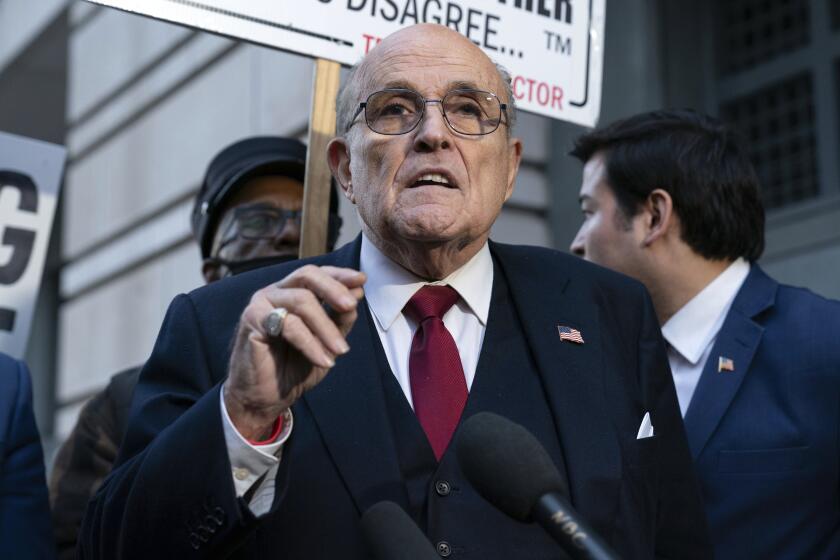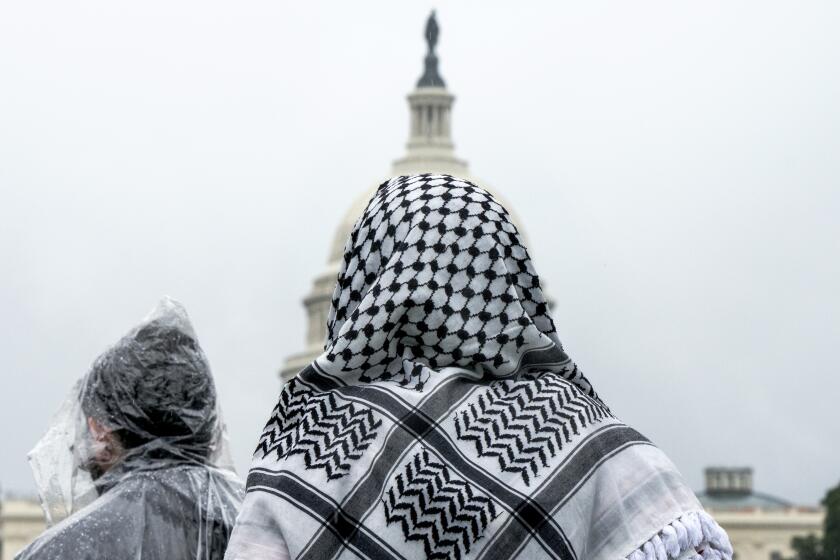Mexicans Cool to U.S. Protest Over Terrorist : Strictly a Local Affair, 2 Congressmen Assert
The Reagan Administration has no business protesting Mexico’s release from prison of a wanted terrorist, two Mexican congressmen were quoted here Thursday as saying in an indirect response to Washington’s temporary recall of its ambassador earlier this week.
“The resolution of the situation is strictly the affair of Mexico,” David Jimenez, a member of Congress and the ruling Institutional Revolutionary Party, told the newspaper Uno Mas Uno.
Gonzalo Badillo, also a PRI member of Congress and a candidate for senator in next week’s elections, declared: “In no way do we accept that the United States interfere in the internal life of Mexico.”
Their comments appeared to reflect the Mexican government’s feelings about U.S. actions and complaints over the release of William Morales, 37, a Puerto Rican separatist convicted in state and federal courts in New York in 1979 on weapons and explosives charges. Morales escaped from a New York hospital and fled to Mexico, where he was jailed in 1983 in the killing of a policeman. Mexico freed Morales from jail last week and let him travel to Cuba after rejecting a longstanding U.S. request for his extradition.
Policy Opponent
Morales’ surprise release resulted from a decision by Foreign Minister Bernardo Sepulveda to overturn a Mexican judge’s ruling that had opened the way for Morales’ extradition. Sepulveda, who has opposed the Reagan Administration’s policy in Nicaragua, El Salvador and Panama, rejected extradition and described Morales as a victim of political persecution in the United States.
Morales was a leader of the Armed Forces of National Liberation, a Puerto Rican separatist group linked to scores of terrorist bombings in the United States in the 1970s.
His release precipitated a diplomatic crisis, as Washington ordered Charles J. Pilliod, its ambassador here, to return to Washington for consultations. Administration spokesmen accused Mexico of harboring a terrorist and trying to make domestic political capital out of differences with the United States.
Privately, Mexican officials confirmed at least part of Washington’s suspicions, saying that turning Morales over to the United States would have given Mexican leftists an issue to exploit in their efforts to weaken the government.
Presidential elections are scheduled here Wednesday, and the government’s candidate, Carlos Salinas de Gortari, is being challenged by a renegade candidate of his party’s left wing, Cuauhtemoc Cardenas.
Official Justification
One official said it was politically impossible for the government of President Miguel de la Madrid “to turn a Puerto Rican David over to the Yankee Goliath.”
The officials called the Administration’s response to the Morales case exaggerated and said they have assured Washington that Mexico is not changing its overall policy regarding Puerto Rico’s status as a U.S. commonwealth. Mexico has usually abstained from voting at the United Nations when other countries, notably Cuba, support resolutions that describe Puerto Rico as a repressed colony.
Comments from newspaper columnists who generally reflect the viewpoint of the government dismissed the incident as merely a difference in points of view. It is common practice in such controversies for columnists and legislators to disclose the government’s position before the government issues an official statement. The Foreign Ministry is not expected to respond officially to Washington’s complaint until Monday.
Columnist Aurora Berdejo commented in the influential daily Excelsior: “For the United States, Morales is a terrorist; for Mexico, he is not. He is, rather, a political fighter for the independence of Puerto Rico. In its irritation that Mexico does not see the case in the same way as the United States, Washington is demonstrating worrisome symptoms of hypersensitivity.
Honeymoon Over?
“In any case, Morales is already gone, and it would be extremely deplorable if, because of this difference in focus, the United States decided once again to introduce tensions or pressures in its relations with Mexico.”
The disagreement appears to have ended an extended honeymoon between Pilliod and the Mexican government. Pilliod, a former tire company executive, had refrained from criticizing Mexico or responding to Mexican criticism of the United States. Mexicans considered his style more agreeable than that of his predecessor, John Gavin, who openly debated foreign policy questions in speeches and in letters to Mexican newspapers.
More to Read
Start your day right
Sign up for Essential California for news, features and recommendations from the L.A. Times and beyond in your inbox six days a week.
You may occasionally receive promotional content from the Los Angeles Times.






